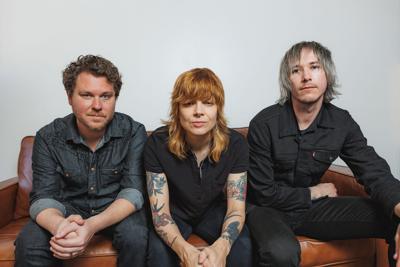
Sarah Shook and the Disarmers
River Shook is more themself than ever on their upcoming Sarah Shook & the Disarmers album Revelations, out Friday via Abeyance Records/Thirty Tigers. With their recent sobriety comes newfound energy. In addition to writing and producing this album — the band’s fourth LP in less than a decade — the accomplished country-informed, narrative-driven singer-songwriter-guitarist produced Cruel Liars, the full-length debut from their indie-rock band Mightmare, as well as fellow North Carolinian Izzy Ryder’s forthcoming debut album.
Shook, who plays 3rd and Lindsley as part of Lightning 100’s Nashville Sunday Night, spoke with me about all the exciting changes leading up to Revelations. Here is an excerpt from a longer conversation you can hear on a forthcoming episode of the Rainbow Rodeo podcast, which highlights the work of queer country artists; it’s a companion to the Rainbow Rodeo zine I edit. Subscribe today to listen to the full interview when it drops on Friday.
You’ve changed your name in your personal life to River, but you’re still performing under the name Sarah. How has that been for you?
It’s still a little bit weird. A couple months before we started talking about releasing the next Sarah Shook & the Disarmers record, there was a big internal conversation about changing the band name: “We have X amount of listeners on Spotify every month. If we change the band name, do those accounts merge? Or is there a new account and all of that data is lost?” We need to make sure we’re still easily accessible to people who want to find us. I’m finally getting to a place where I’m asking fans to call me River. I don’t mind if someone says “Sarah Shook,” but that’s just not me.
It feels like your sound has changed a lot on Revelations, in part because of you producing the album after taking a crack at it with Mightmare. How did that feel for you?
It felt positive. It felt very validating. We worked with Pete Anderson, and there was a lot of butting heads between him and I on stylistic decisions. He was shooting for a certain thing. I felt my voice literally wasn’t being accurately represented. There are a lot of imperfections in my singing voice, and I’m OK with that. That experience really propelled me into music production.
I didn’t start writing songs with the intention of being a great singer or even a great guitarist. My voice is just simply a catalyst for the writing, and to me, the writing is everything. When I’m listening to vocal takes and choosing what’s going to be on the record, I’m not looking for perfection. I’m listening for the thing that makes my heart feel something. If I had a production signature, it would be finding beauty in the flaws.
The songs here are more explicitly queer and explicitly political than ever. Is that also part of your growing comfort?
I think so. With the first two records, I was still drinking really heavily. When you’ve been heavily drinking for a decade, you have to take time to come back to yourself — and that’s really hard, specifically, because if you are a person who’s been abusing substances specifically to get away from yourself, there’s a lot to unpack in there. By the time Revelations rolled around, there were three entire years of growth between albums. I feel like I’m at a place where I’m very secure in my sobriety, and I’m excited about the opportunities that being sober has afforded me.
In 2022, I released two records on two different labels and toured with two different bands — and produced a record for somebody else. I would never have been able to do that if I was drinking. To me, sobriety always had to be more than just, “I don’t drink.” There has to be something more to it that really anchors me and gets me to stay in it. Feeling healthy, feeling energized and excited about music and having the energy to do a lot of different things in music is really motivating.






